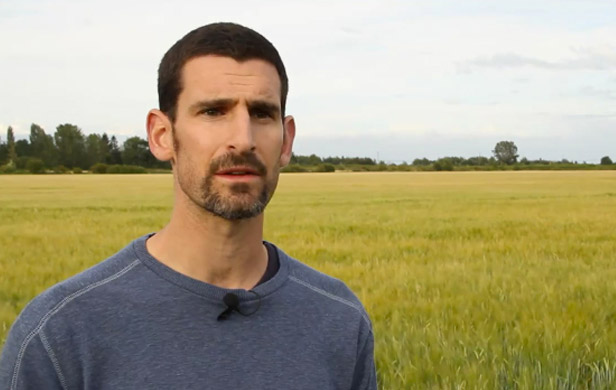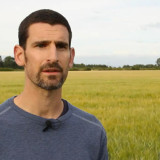
Canada’s most contentious piece of farmland is back on the chopping block as the Corporation of Delta held another in a long line of public hearings into the Southlands property in recent weeks. Debate over the property in the early ’80s yielded the longest public hearing in Canadian history.
On the table today is a revised plan to develop the 500-acre parcel in Boundary Bay for 950 homes. Council closed debate after 5 days of hearings, throughout which 233 people spoke in opposition to the application and 163 in favour.
Of the 2,348 pieces of written correspondence received to date, 1,477 were opposed, with just 871 in favour. Council is set to reconvene Friday to decide on formally closing the hearing process. According to the Delta Optimist, “A special meeting will then commence to consider further action.” Council can vote the project down or decide to refer it to Metro Vancouver, who would also need to remove the property from its regional Green Zone for construction to proceed.
Erosion of democracy
It’s been more than three decades since the Southlands (a.k.a. Spetifore Farm) was removed from the Agricultural Land Reserve by the Socred Government – against the Commission’s advice – prompted by a group of Socred insiders seeking to develop it. Ever since, a battle has raged in the community over various plans to build atop this fertile piece of land.
Builders dismiss its agricultural potential, but soil reports tell a different story. A 217 acre portion of the property was farmed for 40 years and some of it is farmed today – 80 acres for potatoes and barley, plus a popular community garden called Earthwise (see video below).
More than the potential erosion of good, food-producing land, perhaps the biggest issue with the Southlands has been the erosion of local democracy. No development proposal in Canada has faced a longer, more steady, more intense wall of community opposition than the Southlands.
Citizens have lined up at one hearing after another, filled out questionnaires, responded to polls, always with the same message, by a considerable majority – reflected again in the numbers for this latest round of public feedback. They want the property maintained for agricultural use and wildlife habitat.
“Yet again the community has indicated their staunch opposition to this development plan,” says Dana Maslovat of Southlands the Facts, following the recent outpouring of community opposition to the project.
[quote]In the last four years, citizens have been asked again and again if they would support development on the Southlands and each time the answer has remained a resolute “NO!”…It has left the community doubting that this Council and Mayor ever intended to conduct a fair and transparent assessment. [/quote]
The municipality spent several years developing a core planning document to guide development – the Tsawwassen Area Plan – which doesn’t support the development of the Southlands. Yet, two years ago, the owner sought to override that plan for its development. I produced this short documentary on the subject at the time:
Back in 2011, the Municipality of Delta was considering an appeal from owner the Century Group to change the zoning from agricultural to residential (though the property was removed from the ALR years ago, it has retained its municipal agricultural designation). When hundreds of citizens turned out to oppose the move through multiple nights of hearings, the development stalled again.
Maslovat and his allies are frustrated that tax dollars are being used to provide the developer with what seems like an unlimited number of chances to re-submit its application. “It’s the citizens who are paying for this process, time and time again,” Maslovat told me.
Ministry of Agriculture staff critical of plan
The developer has since downgraded its proposal from 1,900 to 950 homes, with a 172 hectares set aside for farmland and public space. Century Group boss Sean Hodgins defends the new application, claiming, “The plan is different, in that it was configured more to the south and now it’s more to the east in response to the soil quality.” The developer’s plan incorporates a “Community-based farming model”, which purports to educate the public about farming by locating small plots near the development.
But Ministry of Agriculture staff are skeptical, outlining their concerns in a letter to mayor and council. They note a report by the developer “does not contain enough details regarding soils, suitable crops, and drainage and irrigation improvements needed at the site.” Moreover, the ministry staff don’t buy the argument that keeping a portion of the property for farming will be a net benefit in terms of promoting agricultural values.
Alternatives to development
The development’s detractors have suggested many alternatives – including creating a land trust to buy the Century Group out at fair market value and convert the land to wildlife refuge and community farming plots not surrounded by development. Naturally, this would require some creative thinking and the support of the municipality and possibly other levels of government, such as was the case with nearby Burns Bog.
There’s no reason this notion should be seen as pie-in-the-sky. The Century Group already made back more money than it ever spent on the property – which it picked up for a fire sale price when the former owner defaulted on its loan – by selling a portion of the original parcel to Metro Vancouver for the popular Boundary Bay Regional Park. The park offers both recreational values and an important sanctuary for birds.
Sitting in the middle of the Pacific Flyway – a major migratory pathway for 5 million birds – both the park and remaining farmland are critical wildlife habitat. Left undeveloped, the Southlands could continue providing habitat while feeding the community through agricultural production.
The Earthwise Garden and Farm offers a glimpse at a real community farming model that could take root in a bigger way on the property, but without the need to develop part of it.
The bottom line is this: if it didn’t make sense to develop the Southlands thirty years ago, then today, with BC producing just 40% of its own food (down almost half from where it was when the Southlands spat began), then it surely doesn’t make sense today.
And the citizens of Delta shouldn’t have to mobilize to make this argument every few years, just because the developer and the municipality feel like it.
The decision is now in the hands of mayor and council. Let’s hope they choose wisely – and definitively.


I hope that the community rallies around this finality and embraces all of its potential
Delta Council approves Southlands development:
http://www.vancouversun.com/Delta+council+approves+controversial+development+Tsawwassen+Southlands/9143786/story.html
I have lived across from the Southlands for 20 years and have no problem with the current proposal. Setting aside 80 per cent of the property for farming and a market is more than reasonable. Most of the property is not farmed, hasn’t been for decades, and never will be — no matter what the soil quality is. And the 80 per cent of the land that will basically remain untouched, coupled with the adjacent Boundary Bay Regional Park — which is nearly 700 acres — provides ample wildlife habitat.
When development was first proposed for this property 30 years ago, the population of Tsawwassen was 20,000. Today, it’s 21,000. This community needs more homes/neighbourhoods for families, not just the odd townhouse complex on 56th Street.
Rob, you may be fine with developing the Southlands but the majority of your community is not – for reasons that are well-warranted, in my view.
Do you recognize the democratic right of your fellow citizens to have a say over the development of your shared community?
People who want to allow others to break the rules are looking ahead, to when they want to break the rules.
Our food security is under assault all over the province. Thousands of acres of prime farmland to be inundated by proposed Site C Dam too:
https://commonsensecanadian.ca/need-site-c-dam-exaggerated-public-hearings-set-next-month/
When will we learn that we can’t eat money or energy?!
Southlands is zoned agriculture and is in Metro Vancouvers green zone but not in the ALR. Port Metro is already ignoring the ALR in told Metro Vancouver thay use the “American System” of (lets make a deal) planning.
The BC Government is considering legislation to gut the ALR. If they do, no land will be protected in the ALR, especially in Delta. Southlands will set the precedent for every piece of farmland in British Columbia.
Thank you Harold for your diligence and insight. We need your courage and commitment, more than ever